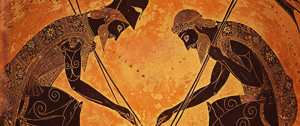Astoundingly green with vast forests and valleys, blessed with numerous famous local produce like wine, cheese and olives, yet filled with examples of Cycladic culture.
When mooring in the island’s capital, Naxos, start your sightseeing with the Castle of Naxos. One of the best preserved fortified settlements of Greece. Naxos is sprinkled with sites of ancient temples. Zeus, Dionysus, Apollo, Demeter and so on. Learn about the locations you should visit on your path in the Naxos Archeological Museum right here in the capital next to the castle. Start off with the Apollo Temple on the small islet next to the old town.
Snack for the day also here in the capital at Naxos cheese making factory, Koufopoulos. Get filled with aromas and tastes at the Olive Oil Mill and Museum Eggaron in Eggares. Drop by Halki, a citrus distillery in Drimalia, if you happen to pass through the center of the island.
Moving inland check the towers of the monastery of Panagia Ypsilotera near Galini. To this day this monastery remains the strongest fortress in Naxos. Snap yourself a souvenir and learn a few things at Damarionas, a ceramic workshop in Damalas.
Get a canyon-like feeling at Emery Mines or Smirida in the Za valley. Warm up your spirit with blossoming orchids when traveling along the Galanado road to Halki. Charm yourself with the mountainous village of Apiranthos. Marble houses and arches, Venetian towers, and marble paved alleys. Feel the atmosphere of Cyclades and learn more in the village’s five museums.
Both Zeus and his son Dionysus grew up on Naxos. Apollo, also had a special connection with the island being worshipped as the protector of the flocks, particularly of the rams and also of flowers. When Theseus made a stop here on the way back to Athens after slaying the Cretan minotaur together with Ariadne, Dinosysus also fell in love with her. He visited Theseus in his sleep and convinced him to leave the island at once. He then married the abandoned Ariadne.
The first inhabitants of Naxos are believed to be Thracian, then there was a period when it was taken by a tribe from Asia Minor, whose king, Naxos, gave the name to the island.
